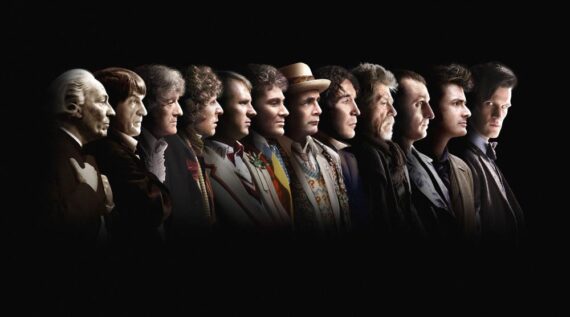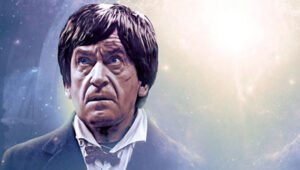The Evolution of the Doctor
Guest contributor Liam Sewell examines the evolution of the Doctor so far and what it might mean for 12.

The Doctor has had many faces and many forms, but many would say that he remains fundamentally unchanged as a character throughout his lives. I’ve often theorised that during the regenerative process, the Doctor either knowingly, or subliminally, rectifies the flaws of his former incarnation; altering certain aspects of his character. I’ve also theorised that the manner in which the Doctor regenerates holds an influence on what becomes of him. For this article I will look in turn at each incarnation, on their flaws, and how they have fixed the problems of the former. I shall also try to shed some light on what influence their last regeneration had on their new personality.
 One:
One:
The First Doctor is generally known for being grumpy and distant, although he mellowed toward the end. Overall he was a stereotypical old man that was sometimes vulnerable, often selfish and always rude. The First Doctor didn’t have any prior flaws to rectify, and unfortunately met his end after his weary old body failed him.
 Two:
Two:
After being killed by the failings of a feeble old body the Doctor became younger, in body and mind. He was whimsical, lighthearted and had a heart of gold. He cared a lot more about the feelings of others, quite a sensitive incarnation at the heart of it. But he lacked authority. His whimsical ways meant that he was often perceived as a farce by his enemies, who couldn’t take him seriously. Our adventures with the Second Doctor were brought to a sudden close by the command of the Gallifreyans.
 Three:
Three:
The structural legal system of Gallifrey, that caused the Doctor’s regeneration certainly rubbed off on his third incarnation. His life began to mirror a scheduled and strict structure; he remained in one place, he got a job, he had routine. However, this also allowed him to have the authority he so desperately lacked in his previous form. He was filled with a sense that he knew what he was doing, he was chief scientific adviser at unit, perceived as authoritative, attracting a higher class of villain. This routine was a flaw in the Doctor however, he lacked freedom to do as he pleased and was stuck in a loop of procedure. Sadly, the Third Doctor’s reign came to an end, and he died bravely facing his fears.
 Four:
Four:
Generally known as a true bohemian, the Fourth Doctor was often found rebelling against any form of structure and sophistication; the universal troll as opposed to the man who follows a rule book. He was fearless and simply laughed in the face of death. He often made a scene of himself, yet remaining perfectly in control. Spontaneous and hands on, it’s no wonder this Doctor perished after taking the high risk of running around at great heights.
 Five:
Five:
The Fifth Doctor was far less reckless, he would put logical thinking before risking his life. His youth concealed his plotting, and so he was able to use his mind more than his hands. The Fifth Doctor died a noble death, sacrificing his own life to save his friend.
 Six:
Six:
It could be said that Peri was the cause of the Fifth Doctor’s regeneration, and perhaps somewhere in his mind the Sixth Doctor wanted to make sure this would never happen again. He inadvertently alienated himself from his friends, deciding to show more interest in himself than his companions. The Sixth Doctor had returned to the manor of making a scene, and sticking out like a sore thumb. He was largely self obsessed and made sure everyone knew how wonderful he was. It was this bragging that got him killed, as the Rani wanted the brain the Doctor had been so proud of and killed him to get it.
 Seven:
Seven:
No longer a show off, the Seventh Doctor kept his true self a mystery, putting on the facade of a clown and hiding his darker motives. He was underestimated by his enemies but was this what he wanted? To be completely inconspicuous, No one would know the power and brilliance he had, he would be disregarded as a fool. The Seventh Doctor unfortunately found himself in the wrong place at the wrong time and perished because of problems in that particular society.
 Eight:
Eight:
He was more of a 19th century romantic than a time travelling genius; his mindset contrasted that of the social problems that killed his last body. He could appreciate the beauty and the natural purity of the world, instead of resenting it for his demise. He could see light in people that others could not, but perhaps he was too much of an idealist to survive in the more harsh conditions. He knew he wasn’t suited to the war environment and so gave way for a new breed of Doctor.

Becoming a warrior in light of the war was an obvious influence. He had no time for appreciating the beauty of life he had to be forward and destructive. The War Doctor was forced to do and see things his former selves would not approve of. He dwelled on these acts, he thought long and hard about his actions letting the memories eat him alive. He regenerated because he was no longer needed.

The Ninth Doctor simply wanted to forget the past, his past. The part of his past that was “no longer needed.” He was constantly trying to move forward, he couldn’t dwell on what he’d lived through or what he’d don’t because he daren’t remember those days. Whenever someone brought up the war he would pass it off as quickly as possible. But he was still full of rage and anger. In the end he was shown compassion by Rose, it fixed his rage but at a cost; he would lose that form.

Perhaps in repayment to Rose, or maybe gratitude, for the most part of his life the Tenth Doctor devoted himself to her. Juxtaposing The Ninth’s rage and ruthlessness, 10 was merciful, giving everyone a chance. However, he was too human, too emotionally attached to Earth. It was this involvement and attachment to the human race and to the friends he had met and loved on Earth that forced his hand to sacrifice himself for an old friend.

He had previously become too human, so it was time for the Doctor to become an alien once more, rectifying the flaw of the Tenth. The Eleventh was childish, fixing the issue his former body had with taking things to heart and looking at everything so seriously. He died because he resigned himself to destiny; ironic thinking how his message was always ‘time can be rewritten’ and when that message changed to “this is my destiny, this is what must happen” he met his triumphant end.

This begs the question of what we can expect from the newest member of The Doctor Club; Number Twelve. So what can we predict? The death by determinism of the Eleventh already tells us that the new Doctor will be rebellious, no more sitting down and accepting things. The BBC have already confirmed this with their “100% rebel timelord” costume. The obvious flaw to fix is Eleven’s childishness, he’s a more mature Doctor physically, and one hopes mentally too. However all this remains to be simple speculation, we will not find out until the new season whether Capaldi will fit the pattern of rectification and influence, or whether he will fit the pattern of any Doctor before him at all, but I suppose we shall have to see…
In conclusion, I think it’s fair to say, there are links that can be made between the differences in character as the Doctor goes through his lives. We can see how he rectifies his problems and mirrors or fixes the errors that caused his last demise. Although it must be said that none of this is set in stone, they’re only possible deductions. I by no means expect you to take this as gospel, of you have your own ideas of what’s going on then by all means remain faithful to them. It just goes to show that what we see televised barely scratches the surface of the show, the mythos is so much more…








